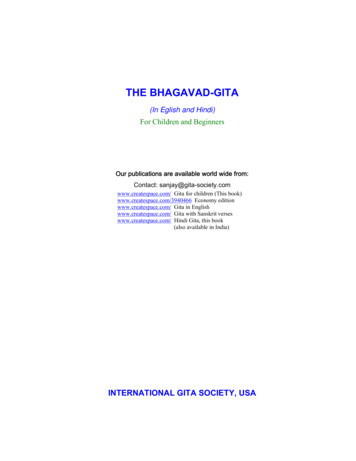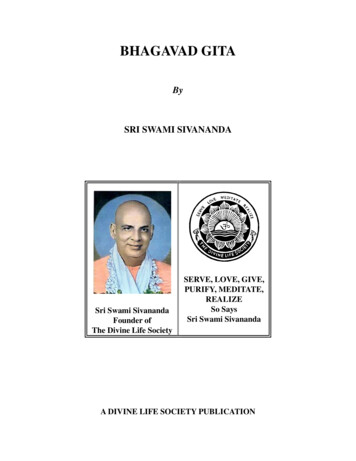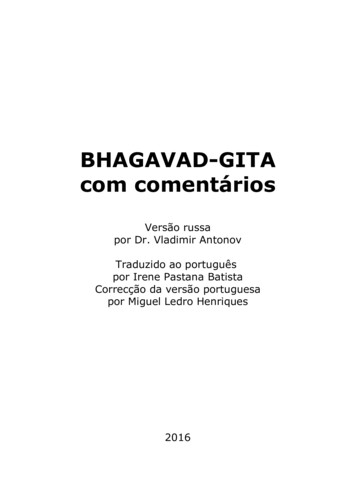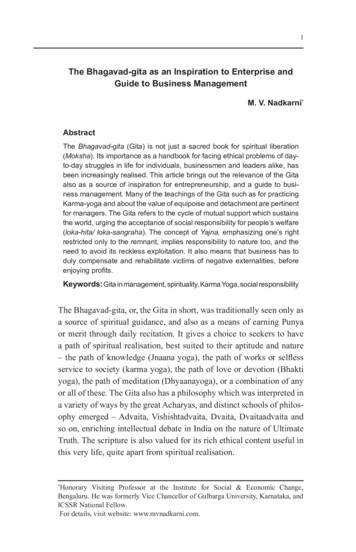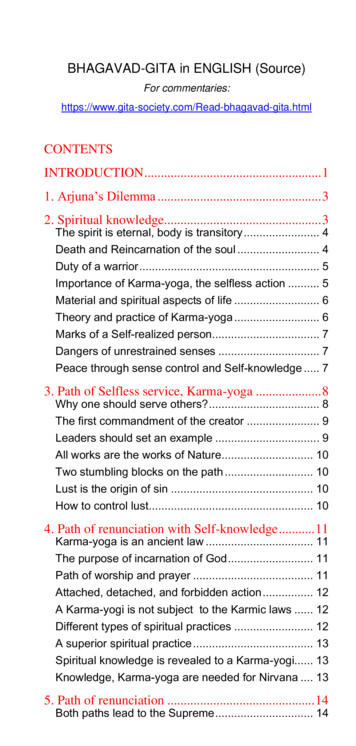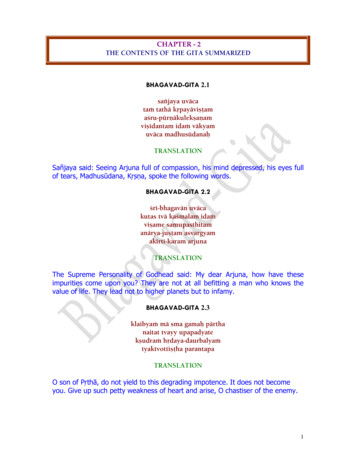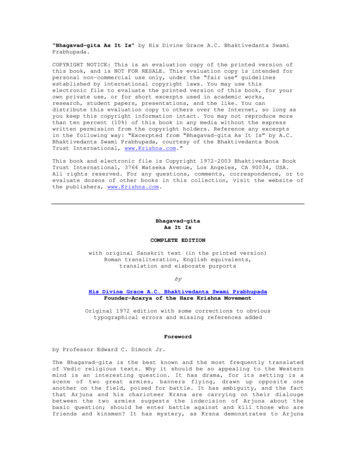
Transcription
Chapter 1 Verse 1Chapter Name -Observing the Armies on the Battlefield of KuruksetraSanskrit Englishdhrtarastra uvacadharma-ksetre kuru-ksetresamaveta yuyutsavahmamakah pandavas caivakim akurvata sanjayaGujarati InterpretationDhrtarastra:,Kuruksetra,?English InterpretationDhrtarastra said: O Sanjaya, after assembling in the place of pilgrimage at Kuruksetra, what did my sons and thesons of Pandu do, being desirous to fight?Chapter 1 Verse 2Chapter Name -Observing the Armies on the Battlefield of KuruksetraSanskrit Englishsanjaya uvacadrstva tu pandavanikamvyudham duryodhanas tadaacaryam upasangamyaraja vacanam abravitGujarati Interpretation1
:,,:English InterpretationSanjaya said: O King, after looking over the army gathered by the sons of Pandu, King Duryodhana went to histeacher and began to speak the following words:Chapter 1 Verse 3Chapter Name -Observing the Armies on the Battlefield of KuruksetraSanskrit Englishpasyaitam pandu-putranamacarya mahatim camumvyudham drupada-putrenatava sisyena dhimataGujarati Interpretation,,.English InterpretationO my teacher, behold the great army of the sons of Pandu, so expertly arranged by your intelligent disciple, theson of Drupada.Chapter 1 Verse 4Chapter Name -Observing the Armies on the Battlefield of KuruksetraSanskrit Englishatra sura mahesvasabhimarjuna-sama yudhiyuyudhano viratas cadrupadas ca maha-rathahGujarati Interpretationઆ; Yuyudhana, Virata.English InterpretationHere in this army there are many heroic bowmen equal in fighting to Bhima and Arjuna; there are also greatfighters like Yuyudhana, Virata and Drupada.Chapter 1 Verse 5Chapter Name -Observing the Armies on the Battlefield of Kuruksetra2
Sanskrit Englishdhrstaketus cekitanahkasirajas ca viryavanpurujit kuntibhojas casaibyas ca nara-pungavahGujarati InterpretationDhrstaketu, Cekitana, Kasiraja, Purujit, KuntibhojaSaibya,,.English InterpretationThere are also great, heroic, powerful fighters like Dhrstaketu, Cekitana, Kasiraja, Purujit, Kuntibhoja and Saibya.Chapter 1 Verse 6Chapter Name -Observing the Armies on the Battlefield of KuruksetraSanskrit Englishyudhamanyus ca vikrantauttamaujas ca viryavansaubhadro draupadeyas casarva eva maha-rathahGujarati InterpretationYudhamanyu, આ.આUttamauja,.English InterpretationThere are the mighty Yudhamanyu, the very powerful Uttamauja, the son of Subhadra and the sons of Draupadi.All these warriors are great chariot fighters.Chapter 1 Verse 7Chapter Name -Observing the Armies on the Battlefield of KuruksetraSanskrit Englishasmakam tu visista yetan nibodha dvijottamanayaka mama sainyasyasamjnartham tan bravimi teGujarati Interpretationઆ,,,.English InterpretationO best of the brahmanas, for your information, let me tell you about the captains who are especially qualified tolead my military force.3
Chapter 1 Verse 8Chapter Name -Observing the Armies on the Battlefield of KuruksetraSanskrit Englishbhavan bhismas ca karnas cakrpas ca samitim-jayahasvatthama vikarnas casaumadattis tathaiva caGujarati Interpretation,,, Krpa, Asvatthama, VikarnaBhurisrava,Somadatta.English InterpretationThere are personalities like yourself, Bhisma, Karna, Krpa, Asvatthama, Vikarna and the son of Somadatta calledBhurisrava, who are always victorious in battle.Chapter 1 Verse 9Chapter Name -Observing the Armies on the Battlefield of KuruksetraSanskrit Englishanye ca bahavah suramad-arthe tyakta-jivitahnana-sastra-praharanahsarve yuddha-visaradahGujarati Interpretationઆ.,.English InterpretationThere are many other heroes who are prepared to lay down their lives for my sake. All of them are wellequipped with different kinds of weapons, and all are experienced in military science.Chapter 1 Verse 10Chapter Name -Observing the Armies on the Battlefield of KuruksetraSanskrit Englishaparyaptam tad asmakambalam bhismabhiraksitamparyaptam tv idam etesambalam bhimabhiraksitamGujarati Interpretation4
,,,.English InterpretationOur strength is immeasurable, and we are perfectly protected by Grandfather Bhisma, whereas the strength ofthe Pandavas, carefully protected by Bhima, is limited.Chapter 1 Verse 11Chapter Name -Observing the Armies on the Battlefield of KuruksetraSanskrit Englishayanesu ca sarvesuyatha-bhagam avasthitahbhismam evabhiraksantubhavantah sarva eva hiGujarati Interpretation,આ.English InterpretationNow all of you must give full support to Grandfather Bhisma, standing at your respective strategic points in thephalanx of the army.Chapter 1 Verse 12Chapter Name -Observing the Armies on the Battlefield of KuruksetraSanskrit Englishtasya sanjanayan harsamkuru-vrddhah pitamahahsimha-nadam vinadyoccaihsankham dadhmau pratapavanGujarati Interpretation,આgrandsire, આઆ,conchshellઆ,.English InterpretationThen Bhisma, the great valiant grandsire of the Kuru dynasty, the grandfather of the fighters, blew his conchshellvery loudly like the sound of a lion, giving Duryodhana joy.Chapter 1 Verse 13Chapter Name -Observing the Armies on the Battlefield of Kuruksetra5
Sanskrit Englishtatah sankhas ca bheryas capanavanaka-gomukhahsahasaivabhyahanyantasa sabdas tumulo 'bhavatGujarati Interpretation", conchshells, bugles,,,.English InterpretationAfter that, the conchshells, bugles, trumpets, drums and horns were all suddenly sounded, and the combinedsound was tumultuous.Chapter 1 Verse 14Chapter Name -Observing the Armies on the Battlefield of KuruksetraSanskrit Englishtatah svetair hayair yuktemahati syandane sthitaumadhavah pandavas caivadivyau sankhau pradadhmatuhGujarati Interpretation,,,conchshells.English InterpretationOn the other side, both Lord Krsna and Arjuna, stationed on a great chariot drawn by white horses, soundedtheir transcendental conchshells.Chapter 1 Verse 15Chapter Name -Observing the Armies on the Battlefield of KuruksetraSanskrit Englishpancajanyam hrsikesodevadattam dhananjayahpaundram dadhmau maha-sankhambhima-karma vrkodarahGujarati Interpretation,Pancajanyaconchshell,6;,;
,, Paundramconchshell.English InterpretationThen, Lord Krsna blew His conchshell, called Pancajanya; Arjuna blew his, the Devadatta; and Bhima, thevoracious eater and performer of Herculean tasks, blew his terrific conchshell called Paundram.Chapter 1 Verse 16-18Chapter Name -Observing the Armies on the Battlefield of KuruksetraSanskrit Englishanantavijayam rajakunti-putro yudhisthirahnakulah sahadevas casughosa-manipuspakaukasyas ca paramesv-asahsikhandi ca maha-rathahdhrstadyumno viratas casatyakis caparajitahdrupado draupadeyas casarvasah prthivi-patesaubhadras ca maha-bahuhsankhan dadhmuh prthak prthakGujarati Interpretation,Manipuspaka,conchshell, આ-.Sikhandi, Dhrstadyumna, Virataઆ Sughosa,,unconquerable Satyaki,,,,,,English InterpretationKing Yudhisthira, the son of Kunti, blew his conchshell, the Ananta-vijaya, and Nakula and Sahadeva blew theSughosa and Manipuspaka. That great archer the King of Kasi, the great fighter Sikhandi, Dhrstadyumna, Virataand the unconquerable Satyaki, Drupada, the sons of Draupadi, and the others, O King, such as the son ofSubhadra, greatly armed, all blew their respective conchshells.Chapter 1 Verse 19Chapter Name -Observing the Armies on the Battlefield of KuruksetraSanskrit Englishsa ghoso dhartarastranamhrdayani vyadarayatnabhas ca prthivim caiva7
tumulo 'bhyanunadayanGujarati rating,.English InterpretationThe blowing of these different conchshells became uproarious, and thus, vibrating both in the sky and on theearth, it shattered the hearts of the sons of Dhrtarastra.Chapter 1 Verse 20Chapter Name -Observing the Armies on the Battlefield of KuruksetraSanskrit Englishatha vyavasthitan drstvadhartarastran kapi-dhvajahpravrtte sastra-sampatedhanur udyamya pandavahhrsikesam tada vakyamidam aha mahi-pateGujarati Interpretation,Dhrtarastra,,,.,આ,Hrsikesa []:English InterpretationO King, at that time Arjuna, the son of Pandu, who was seated in his chariot, his flag marked with Hanuman, tookup his bow and prepared to shoot his arrows, looking at the sons of Dhrtarastra. O King, Arjuna then spoke toHrsikesa [Krsna] these words:Chapter 1 Verse 21-22Chapter Name -Observing the Armies on the Battlefield of KuruksetraSanskrit Englisharjuna uvacasenayor ubhayor madhyeratham sthapaya me 'cyutayavad etan nirikse 'hamyoddhu-kaman avasthitankair maya saha yoddhavyamasmin rana-samudyameGujarati Interpretation8
:,,,આ,.English InterpretationArjuna said: O infallible one, please draw my chariot between the two armies so that I may see who is presenthere, who is desirous of fighting, and with whom I must contend in this great battle attempt.Chapter 1 Verse 23Chapter Name -Observing the Armies on the Battlefield of KuruksetraSanskrit Englishyotsyamanan avekse 'hamya ete 'tra samagatahdhartarastrasya durbuddheryuddhe priya-cikirsavahGujarati InterpretationઆDhrtarastra,.English InterpretationLet me see those who have come here to fight, wishing to please the evil-minded son of Dhrtarastra.Chapter 1 Verse 24Chapter Name -Observing the Armies on the Battlefield of KuruksetraSanskrit Englishsanjaya uvacaevam ukto hrsikesogudakesena bharatasenayor ubhayor madhyesthapayitva rathottamamGujarati Interpretation:,આઆ,.English InterpretationSanjaya said: O descendant of Bharata, being thus addressed by Arjuna, Lord Krsna drew up the fine chariot inthe midst of the armies of both parties.Chapter 1 Verse 25Chapter Name -Observing the Armies on the Battlefield of Kuruksetra9
Sanskrit Englishbhisma-drona-pramukhatahsarvesam ca mahi-ksitamuvaca partha pasyaitansamavetan kurun itiGujarati Interpretation,, Hrsikesa,,,Kurusઆ,.English InterpretationIn the presence of Bhisma, Drona and all other chieftains of the world, Hrsikesa, the Lord, said, Just behold,Partha, all the Kurus who are assembled here.Chapter 1 Verse 26Chapter Name -Observing the Armies on the Battlefield of KuruksetraSanskrit Englishtatrapasyat sthitan parthahpitrn atha pitamahanacaryan matulan bhratrnputran pautran sakhims tathasvasuran suhrdas caivasenayor ubhayor apiGujarati Interpretation,,,,,,,,,wishers -,.English InterpretationThere Arjuna could see, within the midst of the armies of both parties, his fathers, grandfathers, teachers,maternal uncles, brothers, sons, grandsons, friends, and also his father-in-law and well-wishers--all presentthere.Chapter 1 Verse 27Chapter Name -Observing the Armies on the Battlefield of KuruksetraSanskrit Englishtan samiksya sa kaunteyahsarvan bandhun avasthitankrpaya parayavistovisidann idam abravitGujarati Interpretation,,આ"10આ
:English InterpretationWhen the son of Kunti, Arjuna, saw all these different grades of friends and relatives, he became overwhelmedwith compassion and spoke thus:Chapter 1 Verse 28Chapter Name -Observing the Armies on the Battlefield of KuruksetraSanskrit Englisharjuna uvacadrstvemam sva-janam krsnayuyutsum samupasthitamsidanti mama gatranimukham ca parisusyatiGujarati Interpretation,આ:,quivering.English InterpretationArjuna said: My dear Krsna, seeing my friends and relatives present before me in such a fighting spirit, I feel thelimbs of my body quivering and my mouth drying up.Chapter 1 Verse 29Chapter Name -Observing the Armies on the Battlefield of KuruksetraSanskrit Englishvepathus ca sarire meroma-harsas ca jayategandivam sramsate hastattvak caiva paridahyateGujarati Interpretationઆ,.Gandiva.English Interpretation11slipping ,
My whole body is trembling, and my hair is standing on end. My bow Gandiva is slipping from my hand, and myskin is burning.Chapter 1 Verse 30Chapter Name -Observing the Armies on the Battlefield of KuruksetraSanskrit Englishna ca saknomy avasthatumbhramativa ca me manahnimittani ca pasyamiviparitani kesavaGujarati Interpretation.,,reeling.English InterpretationI am now unable to stand here any longer. I am forgetting myself, and my mind is reeling. I foresee only evil, Okiller of the Kesi demon.Chapter 1 Verse 31Chapter Name -Observing the Armies on the Battlefield of KuruksetraSanskrit Englishna ca sreyo 'nupasyamihatva sva-janam ahavena kankse vijayam krsnana ca rajyam sukhani caGujarati Interpretationઆઆ,,,,,.English InterpretationI do not see how any good can come from killing my own kinsmen in this battle, nor can I, my dear Krsna, desireany subsequent victory, kingdom, or happiness.Chapter 1 Verse 32-35Chapter Name -Observing the Armies on the Battlefield of KuruksetraSanskrit Englishkim no rajyena govindakim bhogair jivitena vayesam arthe kanksitam no12
rajyam bhogah sukhani cata ime 'vasthita yuddhepranams tyaktva dhanani caacaryah pitarah putrastathaiva ca pitamahahmatulah svasurah pautrahsyalah sambandhinas tathaetan na hantum icchamighnato 'pi madhusudanaapi trailokya-rajyasyahetoh kim nu mahi-krtenihatya dhartarastran nahka pritih syaj janardanaGujarati Interpretation,આ,?,,,,આ,આ,,,English InterpretationO Govinda, of what avail to us are kingdoms, happiness or even life itself when all those for whom we maydesire them are now arrayed in this battlefield? O Madhusudana, when teachers, fathers, sons, grandfathers,maternal uncles, fathers-in-law, grandsons, brothers-in-law and all relatives are ready to give up their lives andproperties and are standing before me, then why should I wish to kill them, though I may survive? O maintainerof all creatures, I am not prepared to fight with them even in exchange for the three worlds, let alone this earth.Chapter 1 Verse 36Chapter Name -Observing the Armies on the Battlefield of KuruksetraSanskrit Englishpapam evasrayed asmanhatvaitan atatayinahtasman narha vayam hantumdhartarastran sa-bandhavansva-janam hi katham hatvasukhinah syama madhavaGujarati Interpretationઆ.આ,.Dhrtarastra,,?13
English InterpretationSin will overcome us if we slay such aggressors. Therefore it is not proper for us to kill the sons of Dhrtarastraand our friends. What should we gain, O Krsna, husband of the goddess of fortune, and how could we be happyby killing our own kinsmen?Chapter 1 Verse 37-38Chapter Name -Observing the Armies on the Battlefield of KuruksetraSanskrit Englishyady apy ete na pasyantilobhopahata-cetasahkula-ksaya-krtam dosammitra-drohe ca patakamkatham na jneyam asmabhihpapad asman nivartitumkula-ksaya-krtam dosamprapasyadbhir janardanaGujarati Interpretation,આ,,આ,,quarreling,આ?English InterpretationO Janardana, although these men, overtaken by greed, see no fault in killing one's family or quarreling withfriends, why should we, with knowledge of the sin, engage in these acts?Chapter 1 Verse 39Chapter Name -Observing the Armies on the Battlefield of KuruksetraSanskrit Englishkula-ksaye pranasyantikula-dharmah sanatanahdharme naste kulam krtsnamadharmo 'bhibhavaty utaGujarati Interpretation,આ,.English InterpretationWith the destruction of dynasty, the eternal family tradition is vanquished, and thus the rest of the familybecomes involved in irreligious practice.14,
Chapter 1 Verse 40Chapter Name -Observing the Armies on the Battlefield of KuruksetraSanskrit Englishadharmabhibhavat krsnapradusyanti kula-striyahstrisu dustasu varsneyajayate varna-sankarahGujarati Interpretation-,,,આ,, Vrsni.English InterpretationWhen irreligion is prominent in the family, O Krsna, the women of the family become corrupt, and from thedegradation of womanhood, O descendant of Vrsni, comes unwanted progeny.Chapter 1 Verse 41Chapter Name -Observing the Armies on the Battlefield of KuruksetraSanskrit Englishsankaro narakayaivakula-ghnanam kulasya capatanti pitaro hy esamlupta-pindodaka-kriyahGujarati Interpretation,આ.આ,oblations.English InterpretationWhen there is increase of unwanted population, a hellish situation is created both for the family and for thosewho destroy the family tradition. In such corrupt families, there is no offering of oblations of food and water tothe ancestors.Chapter 1 Verse 42Chapter Name -Observing the Armies on the Battlefield of KuruksetraSanskrit Englishdosair etaih kula-ghnanamvarna-sankara-karakaihutsadyante jati-dharmahkula-dharmas ca sasvatahGujarati Interpretation15
,આ.English InterpretationDue to the evil deeds of the destroyers of family tradition, all kinds of community projects and family welfareactivities are devastated.Chapter 1 Verse 43Chapter Name -Observing the Armies on the Battlefield of KuruksetraSanskrit Englishutsanna-kula-dharmanammanusyanam janardananarake niyatam vasobhavatity anususrumaGujarati Interpretation,,-.English InterpretationO Krsna, maintainer of the people, I have heard by disciplic succession that those who destroy family traditionsdwell always in hell.Chapter 1 Verse 44Chapter Name -Observing the Armies on the Battlefield of KuruksetraSanskrit Englishaho bata mahat papamkartum vyavasita vayamyad rajya-sukha-lobhenahantum sva-janam udyatahGujarati Interpretation,,આ.English InterpretationAlas, how strange it is that we are preparing to commit greatly sinful acts, driven by the desire to enjoy royalhappiness.Chapter 1 Verse 45Chapter Name -Observing the Armies on the Battlefield of Kuruksetra16
Sanskrit Englishyadi mam apratikaramasastram sastra-panayahdhartarastra rane hanyustan me ksemataram bhavetGujarati Interpretation,unresistingDhrtarastra.English InterpretationI would consider it better for the sons of Dhrtarastra to kill me unarmed and unresisting, rather than to fightwith them.Chapter 1 Verse 46Chapter Name -Observing the Armies on the Battlefield of KuruksetraSanskrit Englishsanjaya uvacaevam uktvarjunah sankhyerathopastha upavisatvisrjya sa-saram capamsoka-samvigna-manasahGujarati Interpretation:,આ,,.English InterpretationSanjaya said: Arjuna, having thus spoken on the battlefield, cast aside his bow and arrows and sat down on thechariot, his mind overwhelmed with grief.Chapter 2 Verse 1Chapter Name -Contents of the Gita SummarizedSanskrit Englishsanjaya uvacatam tatha krpayavistamasru-purnakuleksanamvisidantam idam vakyamuvaca madhusudanahGujarati Interpretation:,brimming17,,,
.English InterpretationSanjaya said: Seeing Arjuna full of compassion and very sorrowful, his eyes brimming with tears, Madhusudana,Krsna, spoke the following words.Chapter 2 Verse 2Chapter Name -Contents of the Gita SummarizedSanskrit Englishsri-bhagavan uvacakutas tva kasmalam idamvisame samupasthitamanarya-justam asvargyamakirti-karam arjunaGujarati Interpretation[],આ:befittingઆ.,?.English InterpretationThe Supreme Person [Bhagavan] said: My dear Arjuna, how have these impurities come upon you? They are notat all befitting a man who knows the progressive values of life. They do not lead to higher planets, but to infamy.Chapter 2 Verse 3Chapter Name -Contents of the Gita SummarizedSanskrit Englishklaibyam ma sma gamah parthanaitat tvayy upapadyateksudram hrdaya-daurbalyamtyaktvottistha parantapaGujarati InterpretationPrtha,આ.આ.,chastiser.English InterpretationO son of Prtha, do not yield to this degrading impotence. It does not become you. Give up such petty weaknessof heart and arise, O chastiser of the enemy.Chapter 2 Verse 4Chapter Name -Contents of the Gita Summarized18
Sanskrit Englisharjuna uvacakatham bhismam aham sankhyedronam ca madhusudanaisubhih pratiyotsyamipujarhav ari-sudanaGujarati Interpretation:,[],?English InterpretationArjuna said: O killer of Madhu [Krsna], how can I counterattack with arrows in battle men like Bhisma and Drona,who are worthy of my worship?Chapter 2 Verse 5Chapter Name -Contents of the Gita SummarizedSanskrit Englishgurun ahatva hi mahanubhavansreyo bhoktum bhaiksyam apiha lokehatvartha-kamams tu gurun ihaivabhunjiya bhogan rudhira-pradigdhanGujarati Interpretationઆ.આ,.આ.English InterpretationIt is better to live in this world by begging than to live at the cost of the lives of great souls who are my teachers.Even though they are avaricious, they are nonetheless superiors. If they are killed, our spoils will be tainted withblood.Chapter 2 Verse 6Chapter Name -Contents of the Gita SummarizedSanskrit Englishna caitad vidmah kataran no gariyoyad va jayema yadi va no jayeyuhyan eva hatva na jijivisamaste 'vasthitah pramukhe dhartarastrahGujarati Interpretation19
આ-,.,Dhrtarastra,આ.English InterpretationNor do we know which is better--conquering them or being conquered by them. The sons of Dhrtarastra, whomif we kill we should not care to live, are now standing before us on this battlefield.Chapter 2 Verse 7Chapter Name -Contents of the Gita SummarizedSanskrit Englishkarpanya-dosopahata-svabhavahprcchami tvam dharma-sammudha-cetahyac chreyah syan niscitam bruhi tan mesisyas te 'ham sadhi mam tvam prapannamGujarati Interpretation.આ.આ,આઆઆ.English InterpretationNow I am confused about my duty and have lost all composure because of weakness. In this condition I amasking You to tell me clearly what is best for me. Now I am Your disciple, and a soul surrendered unto You.Please instruct me.Chapter 2 Verse 8Chapter Name -Contents of the Gita SummarizedSanskrit Englishna hi prapasyami mamapanudyadyac chokam ucchosanam indriyanamavapya bhumav asapatnam rddhamrajyam suranam api cadhipatyamGujarati Interpretationઆ.demigods.English InterpretationI can find no means to drive away this grief which is drying up my senses. I will not be able to destroy it even if Iwin an unrivaled kingdom on earth with sovereignty like the demigods in heaven.20
Chapter 2 Verse 9Chapter Name -Contents of the Gita SummarizedSanskrit Englishsanjaya uvacaevam uktva hrsikesamgudakesah parantapahna yotsya iti govindamuktva tusnim babhuva haGujarati Interpretation:આ,,chastiser, ",,",.English InterpretationSanjaya said: Having spoken thus, Arjuna, chastiser of enemies, told Krsna, "Govinda, I shall not fight," and fellsilent.Chapter 2 Verse 10Chapter Name -Contents of the Gita SummarizedSanskrit Englishtam uvaca hrsikesahprahasann iva bharatasenayor ubhayor madhyevisidantam, idam vacahGujarati Interpretation,,,આ,.English InterpretationO descendant of Bharata, at that time Krsna, smiling, in the midst of both the armies, spoke the following wordsto the grief-stricken Arjuna.Chapter 2 Verse 11Chapter Name -Contents of the Gita SummarizedSanskrit Englishsri-bhagavan uvacaasocyan anvasocas tvamprajna-vadams ca bhasasegatasun agatasums cananusocanti panditah21
Gujarati Interpretation:.આ,.English InterpretationThe Blessed Lord said: While speaking learned words, you are mourning for what is not worthy of grief. Thosewho are wise lament neither for the living nor the dead.Chapter 2 Verse 12Chapter Name -Contents of the Gita SummarizedSanskrit Englishna tv evaham jatu nasamna tvam neme janadhipahna caiva na bhavisyamahsarve vayam atah paramGujarati Interpretation,,આ;.English InterpretationNever was there a time when I did not exist, nor you, nor all these kings; nor in the future shall any of us ceaseto be.Chapter 2 Verse 13Chapter Name -Contents of the Gita SummarizedSanskrit Englishdehino 'smin yatha dehekaumaram yauvanam jaratatha dehantara-praptirdhiras tatra na muhyatiGujarati .English InterpretationAs the embodied soul continuously passes, in this body, from boyhood to youth to old age, the soul similarlypasses into another body at death. A self-realized soul is not bewildered by such a change.Chapter 2 Verse 1422
Chapter Name -Contents of the Gita SummarizedSanskrit Englishmatra-sparsas tu kaunteyasitosna-sukha-duhkha-dahagamapayino 'nityastams titiksasva bharataGujarati Interpretation,nonpermanent.,,,,.English InterpretationO son of Kunti, the nonpermanent appearance of happiness and distress, and their disappearance in due course,are like the appearance and disappearance of winter and summer seasons. They arise from sense perception, Oscion of Bharata, and one must learn to tolerate them without being disturbed.Chapter 2 Verse 15Chapter Name -Contents of the Gita SummarizedSanskrit Englishyam hi na vyathayanty etepurusam purusarsabhasama-duhkha-sukham dhiramso 'mrtatvaya kalpateGujarati Interpretation[],.English InterpretationO best among men [Arjuna], the person who is not disturbed by happiness and distress and is steady in both iscertainly eligible for liberation.Chapter 2 Verse 16Chapter Name -Contents of the Gita SummarizedSanskrit Englishnasato vidyate bhavonabhavo vidyate satahubhayor api drsto 'ntastv anayos tattva-darsibhihGujarati Interpretation23
seersઆ. આ seers,.English InterpretationThose who are seers of the truth have concluded that of the nonexistent there is no endurance, and of theexistent there is no cessation. This seers have concluded by studying the nature of both.Chapter 2 Verse 17Chapter Name -Contents of the Gita SummarizedSanskrit Englishavinasi tu tad viddhiyena sarvam idam tatamvinasam avyayasyasyana kascit kartum arhatiGujarati Interpretationઆ.આ.English InterpretationKnow that which pervades the entire body is indestructible. No one is able to destroy the imperishable soul.Chapter 2 Verse 18Chapter Name -Contents of the Gita SummarizedSanskrit Englishantavanta ime dehanityasyoktah saririnahanasino 'prameyasyatasmad yudhyasva bharataGujarati Interpretationઆ,;,.English InterpretationOnly the material body of the indestructible, immeasurable and eternal living entity is subject to destruction;therefore, fight, O descendant of Bharata.Chapter 2 Verse 19Chapter Name -Contents of the Gita SummarizedSanskrit Englishya enam vetti hantaramyas cainam manyate hatam24
ubhau tau na vijanitonayam hanti na hanyateGujarati Interpretationઆ,slays.English InterpretationHe who thinks that the living entity is the slayer or that he is slain, does not understand. One who is inknowledge knows that the self slays not nor is slain.Chapter 2 Verse 20Chapter Name -Contents of the Gita SummarizedSanskrit Englishna jayate mriyate va kadacinnayam bhutva bhavita va na bhuyahajo nityah sasvato 'yam puranona hanyate hanyamane sarireGujarati Interpretationઆ.,,,.,.English InterpretationFor the soul there is never birth nor death. Nor, having once been, does he ever cease to be. He is unborn,eternal, ever-existing, undying and primeval. He is not slain when the body is slain.Chapter 2 Verse 21Chapter Name -Contents of the Gita SummarizedSanskrit Englishvedavinasinam nityamya enam ajam avyayamkatham sa purusah parthakam ghatayati hanti kamGujarati Interpretation,આ,,,?English InterpretationO Partha, how can a person who knows that the soul is indestructible, unborn, eternal and immutable, killanyone or cause anyone to kill?25
Chapter 2 Verse 22Chapter Name -Contents of the Gita SummarizedSanskrit Englishvasamsi jirnani yatha vihayanavani grhnati naro 'paranitatha sarirani vihaya jirnanyanyani samyati navani dehiGujarati Interpretation,આ,આ,આ,.English InterpretationAs a person puts on new garments, giving up old ones, similarly, the soul accepts new material bodies, giving upthe old and useless ones.Chapter 2 Verse 23Chapter Name -Contents of the Gita SummarizedSanskrit Englishnainam chindanti sastraninainam dahati pavakahna cainam kledayanty apona sosayati marutahGujarati Interpretationઆ,,moistened,withered.English InterpretationThe soul can never be cut into pieces by any weapon, nor can he be burned by fire, nor moistened by water, norwithered by the wind.Chapter 2 Verse 24Chapter Name -Contents of the Gita SummarizedSanskrit Englishacchedyo 'yam adahyo 'yamakledyo 'sosya eva canityah sarva-gatah sthanuracalo 'yam sanatanahGujarati Interpretation26
આઆ,.,,.English InterpretationThis individual soul is unbreakable and insoluble, and can be neither burned nor dried. He is everlasting, allpervading, unchangeable, immovable and eternally the same.Chapter 2 Verse 25Chapter Name -Contents of the Gita SummarizedSanskrit Englishavyakto 'yam acintyo 'yamavikaryo 'yam ucyatetasmad evam viditvainamnanusocitum arhasiGujarati Interpretationઆ,,.આ,,.English InterpretationIt is said that the soul is invisible, inconceivable, immutable, and unchangeable. Knowing this, you should notgrieve for the body.Chapter 2 Verse 26Chapter Name -Contents of the Gita SummarizedSanskrit Englishatha cainam nitya-jatamnityam va manyase mrtamtathapi tvam maha-bahonainam socitum arhasiGujarati Interpretation,આ,આ.English InterpretationIf, however, you think that the soul is perpetually born and always dies, still you still have no reason to lament, Omighty-armed.Chapter 2 Verse 27Chapter Name -Contents of the Gita Summarized27
Sanskrit Englishjatasya hi dhruvo mrtyurdhruvam janma mrtasya catasmad apariharye 'rthena tvam socitum arhasiGujarati Interpretationઆ,;,,.,.English InterpretationFor one who has taken his birth, death is certain; and for one who is dead, birth is certain. Therefore, in theunavoidable discharge of your duty, you should not lament.Chapter 2 Verse 28Chapter Name -Contents of the Gita SummarizedSanskrit Englishavyaktadini bhutanivyakta-madhyani bharataavyakta-nidhanany evatatra ka paridevanaGujarati Interpretation,આ.,?English InterpretationAll created beings are unmanifest in their beginning, manifest in their interim state, and unmanifest again whenthey are annihilated. So what need is there for lamentation?Chapter 2 Verse 29Chapter Name -Contents of the Gita SummarizedSanskrit Englishascarya-vat pasyati kascid enamascarya-vad vadati tathaiva canyahascarya-vac cainam anyah srnotisrutvapy enam veda na caiva kascitGujarati Interpretationઆ,,,,,28.
English InterpretationSome look at the soul as amazing, some describe him as amazing, and some hear of him as amazing, whileothers, even after hearing about him, cannot understand him at all.Chapter 2 Verse 30Chapter Name -Contents of the Gita SummarizedSanskrit Englishdehi nityam avadhyo 'yamdehe sarvasya bharatatasmat sarvani bhutanina tvam socitum arhasiGujarati Interpretationdwells,.English InterpretationO descendant of Bharata, he who dwells in the body is eternal and can never be slain. Therefore you need notgrieve for any creature.Chapter 2 Verse 31Chapter Name -Contents of the Gita SummarizedSanskrit Englishsva-dharmam api caveksyana vikampitum arhasidharmyad dhi yuddhac chreyo 'nyatksatriyasya na vidyateGujarati InterpretationKsatriya,;.English InterpretationCon
3 Sanskrit English dhrstaketus cekitanah kasirajas ca viryavan purujit kuntibhojas ca saibyas ca nara-pungavah Gujarati Interpretation Dhrstak

